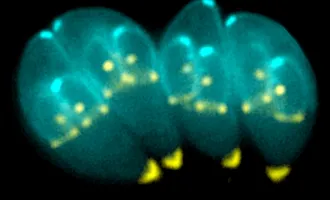Would You Rather?
“Would you rather live forever or die in the next five seconds?”
This question was posed to me recently and I was flummoxed. Most people, according to the asker, say they would die in the next five seconds.
It took me much longer than five seconds to answer, so I guess I was already doomed to an eternal life and to the painful demands of being a thinking, sentient lifeform forever.
Of course, such a question is merely hypothetical. However, more moderate manipulations of longevity are very real in biology.
For the purpose of demonstration, let’s make things a bit more concrete: a tiny translucent worm sits in a nondescript dish, in another cookie-cutter laboratory. This worm is Caenorhabditis elegans, the most common worm used in laboratory studies, and it will live for about 30 days. Poor little worm.
What I suspect is not so widely known, at least outside of the laboratory setting, is that scientists can use a handful of tricks to make this worm live longer.
For instance, calorie restriction is known to slow the aging process in C. elegans. This is not merely idiosyncratic, as calorie restriction also extends lifespan in flies, dogs, and mice.
The results on primates are preliminary and contradictory. It should also be noted that some qualms have been raised with these studies — one being that the control animals used in these experiments (the ones fed “normal” diets) have access to unlimited food which may be making them artificially unhealthy.
Nevertheless, a friend of mine is an early adopter of the “no food diet.”
Mild starvation isn’t the only strategy scientists can use. It turns out that inhibiting respiration in worms and flies, by blocking genes required for the mitochondrial respiration pathway, also leads to lifespan extension.
Mild suffocation, in a way, is another fountain of youth. Low levels of some toxins also do the work.
We can punish our worm in a variety of ways and s/he (C. elegans are hermaphrodites) will activate a protective biological response that actually increases lifespan compared to the silver-spoon control worms.
Your sadsack high-school football coach was right: what doesn’t kill you makes you stronger.
UCSF Emeritus Professor Cynthia Kenyon is the world’s most prominent expert on aging in C. elegans (and perhaps on aging in general).
In 1993, her lab showed that lifespan extension was not just a product of mildly stressful environments, but was encoded in genes. By removing one gene, Daf-2, from our peaceful little worm, s/he lived twice as long: a whopping 60 days.
Although Kenyon now works for the life sciences company Calico (sister to Google under the umbrella of Alphabet Inc.) as VP of Aging Research, her UCSF lab has recently published an impressive study, led by post-doctoral fellow Yuehau Wei.
The recent paper, published on May 17 in the Proceedings of the National Academy of Sciences, explores how the loss of germline cells in worms (their eggs/sperm) leads to lifespan extension.
Because the theory of evolution stipulates that successful organisms live long enough to reproduce, there is great interest in understanding the connections between reproductive signals and lifespan.
Removing flowers can extend the lifespan of plants, and transplanting younger ovaries into old females can extend the lifespan of mice.
Surprisingly, and perhaps contradictory, castration has been suggested to extend the lifespan of numerous animals, including humans (although no one study has been convincing).
In their recent study, Wei and Kenyon show that the less dramatic process of removing C. elegans germline cells increases their lifespan through the generation of low levels of harmful chemicals.
In particular, germline cell loss increases levels of reactive oxygen species and hydrogen sulfide.
The boisterous nature of both of these chemicals is normally bad news for an organism: these molecules have the ability to react with essential proteins and even DNA.
But at low levels they also have the ability to trigger cellular protective responses.
This recent work adds to evidence that reactive oxygen species are also involved in lifespan extension caused by calorie restriction, respiration inhibition, and other tricks.
Kenyon and Wei describe these chemicals as “general components of biological longevity pathways.”
That there is a common thread to all the seemingly disparate ways of extending longevity suggests the existence of a central node in the intelligence of life, one that helps decide when it is appropriate to live longer.
Of course, manipulating this mechanism with a pharmaceutical would take the power out of evolutionary history and put it into our own meddling hands. Which would you rather?



